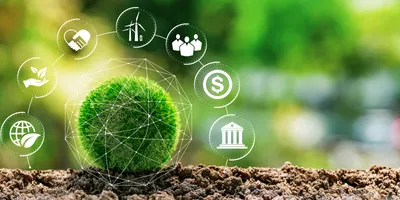The global conversation around sustainability often gets mired in politics. But at the My Green Lab Summit 2025, three pharmaceutical executives cut through the noise with a clear message: in today’s uncertain climate, sustainability is business survival.
“Sustainability isn’t a political topic. This is a topic about business efficacy,” said Jeffrey Whitford, vice president of sustainability and social business innovation at MilliporeSigma. “If we can be an extraordinary partner…we hope companies will trust us and choose to do more business with us, because we can quantify and give them a range of products that have specific reductions and improvements that help them achieve their sustainability goals.”
Their remarks underscored a growing reality for science-driven organizations: environmental stewardship is no longer a side initiative, but a central strategy for resilience, efficiency, and long-term growth.
Sustainability as business value
For Takeda, anchoring sustainability in core purpose is a way to steady the ship during turbulent times. Johanna Jobin, global head of environment and sustainability, described it this way: “For Takeda, that means creating better health for people, a brighter future for our world. Our corporate philosophy, our patients, and our commitment to people and the planet is our corporate strategy.”
That purpose translates into measurable action. Takeda has pledged to certify all R&D and global quality labs through the My Green Lab program by 2030. Forty percent of labs are already certified, with savings like $30,000 annually at a Georgia site, thanks to simple efficiency improvements. In Jobin’s view, these results are proof that sustainability doesn’t drain resources—it generates them.
Whitford echoed that sentiment, pointing to MilliporeSigma’s transformation of its R&D pipeline. Embedding sustainability into product development has tripled the number of green alternatives in its portfolio. “We cannot have a green premium be the way we’re going to make it through,” he said. “We need to figure out how we get to price parity—because I need our customers to choose us.”
The message is clear: sustainability is not charity work. It is a strategy that strengthens competitiveness in a volatile market.
Climate crisis as a health crisis
AstraZeneca takes the argument even further, framing climate change as inseparable from its healthcare mission. “We actually think the climate crisis is one of the greatest healthcare crises of our time,” said Liz Chatwin, vice president of global sustainability and safety, health, and environment.
The company’s progress backs up the rhetoric: more than 100 My Green Lab certifications, nearly half at the top “green” standard, and an industry-first commitment to decarbonize clinical trials through the Sustainable Markets Initiative by 2030.
For Chatwin, these steps are as much about collective responsibility as corporate leadership. “Driving a more sustainable planet for our collective future is a team sport. We can’t do it as one company.”
Long-term bets, short-term payoffs
Despite the economic and political headwinds all three acknowledged, the panelists remained optimistic. Whitford noted that sustainability investments create both credibility and capital for innovation. “We’re still providing value to the business. That gives us leverage to invest in next-generation technologies that help our customers deliver life-saving medicines.”
Jobin closed on a reminder that Takeda’s approach is deeply cultural, rooted in the company’s Japanese decision-making framework of patients, trust, reputation, and business. “While we need to actively manage today’s challenges…we also know that sustainability requires more than just a short-term commitment.”
Final thoughts
Sustainability in the lab is no longer about optics or compliance. It is about cost savings, supply chain resilience, and the ability to deliver science in a fragile global economy. In other words, it is not politics—it is survival.













